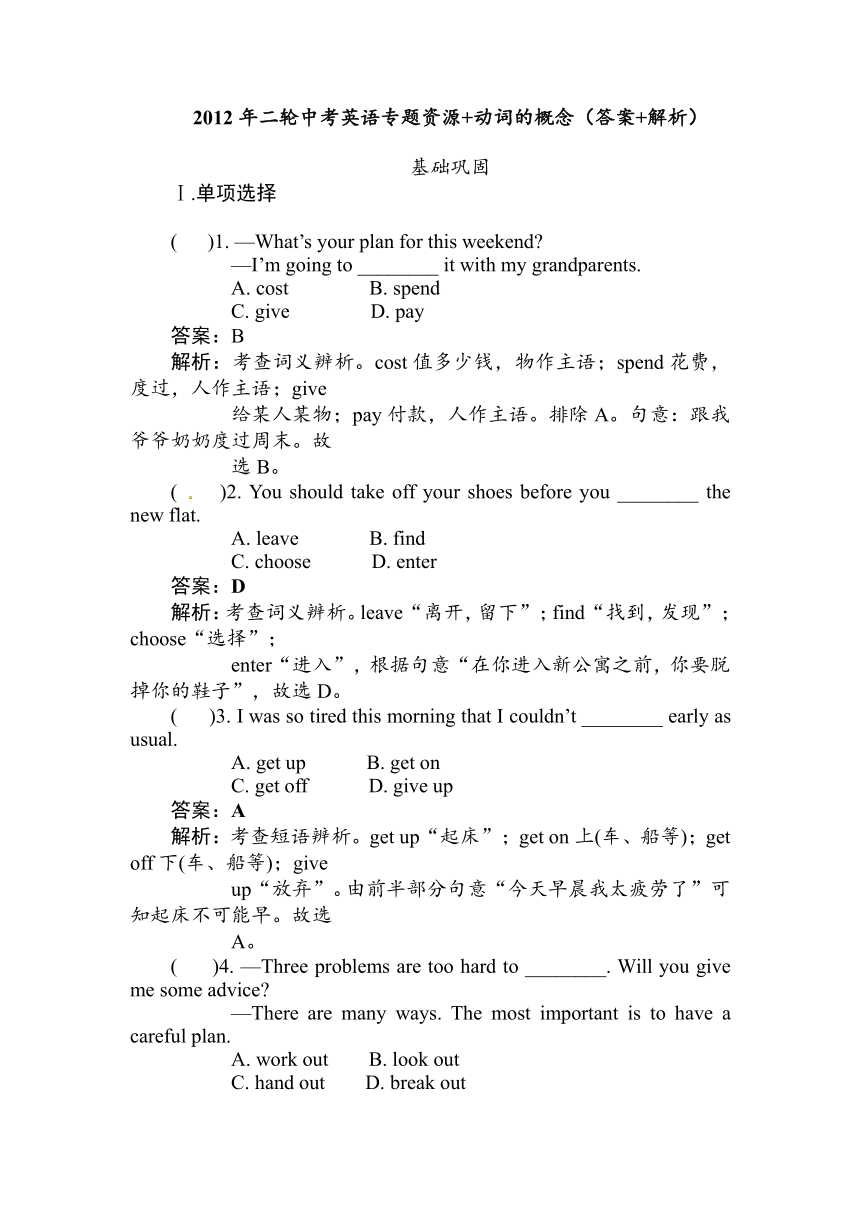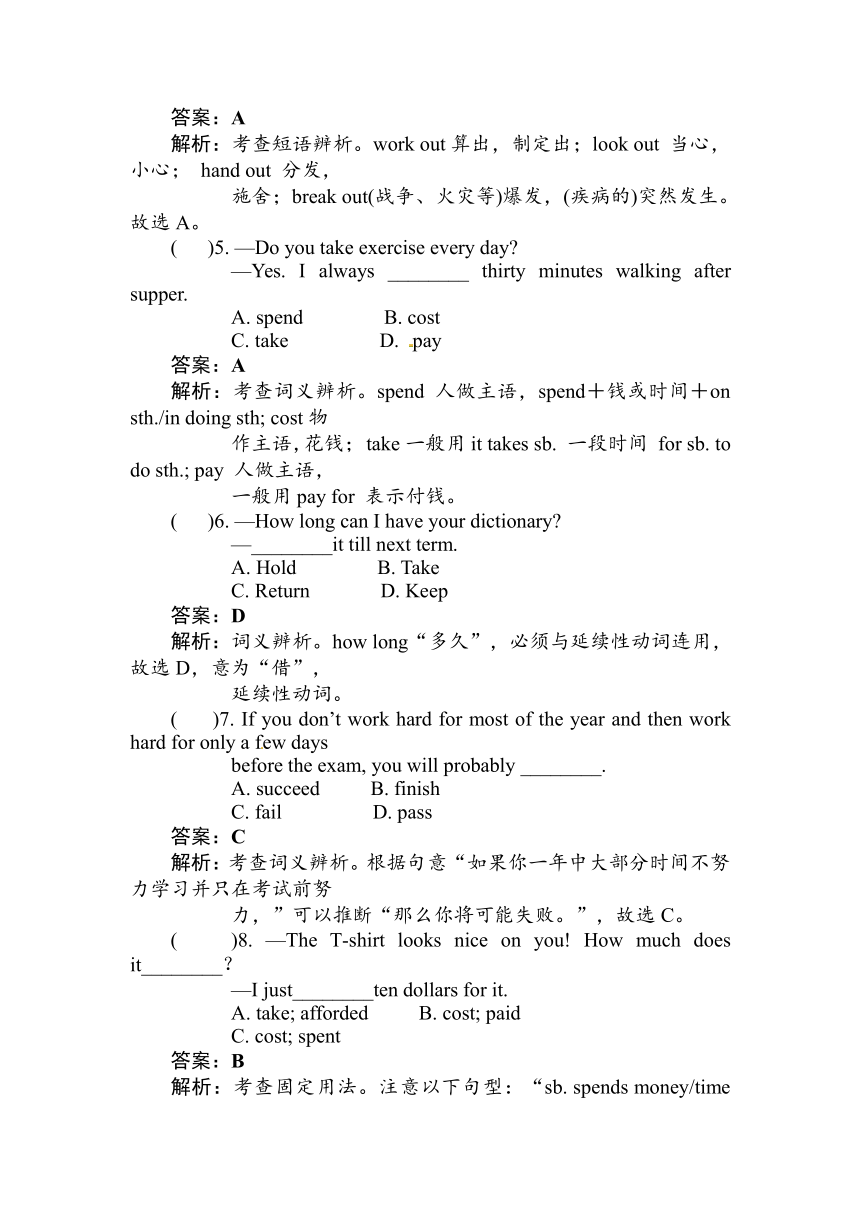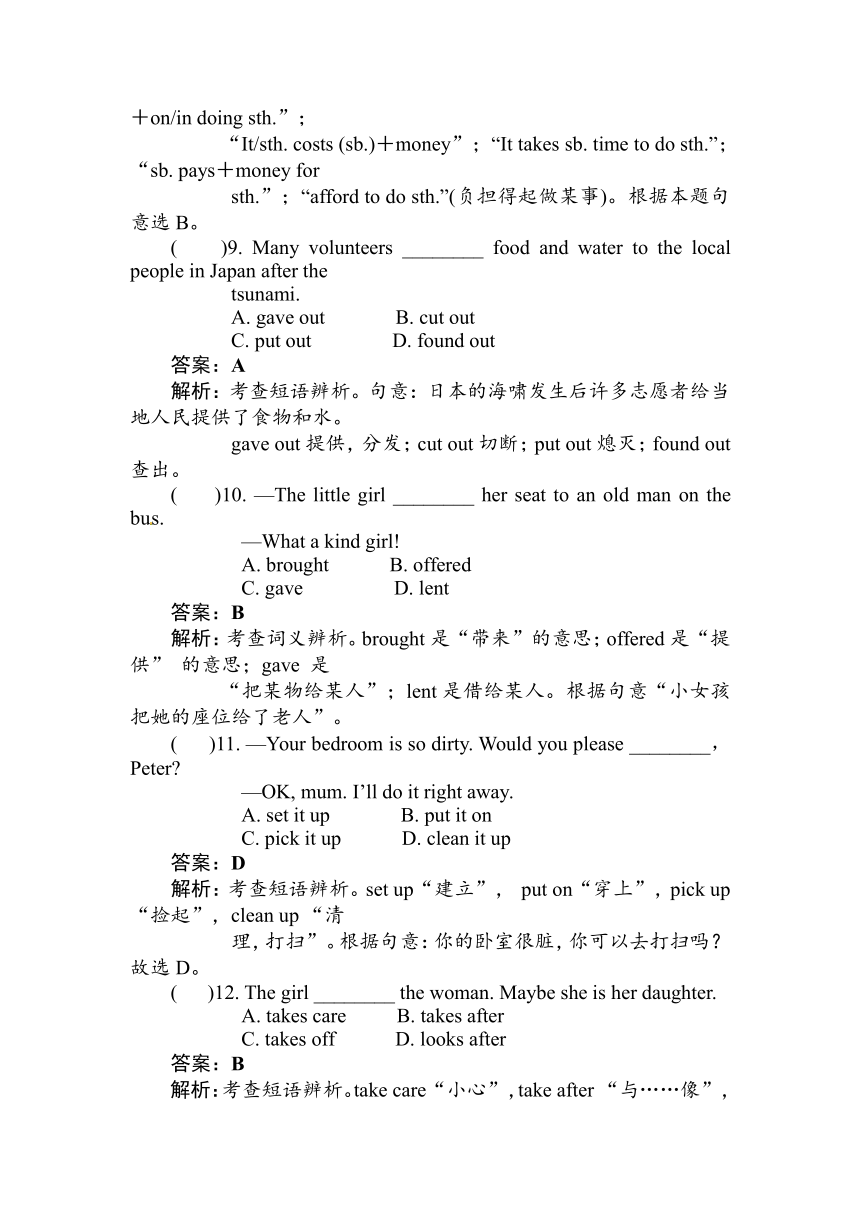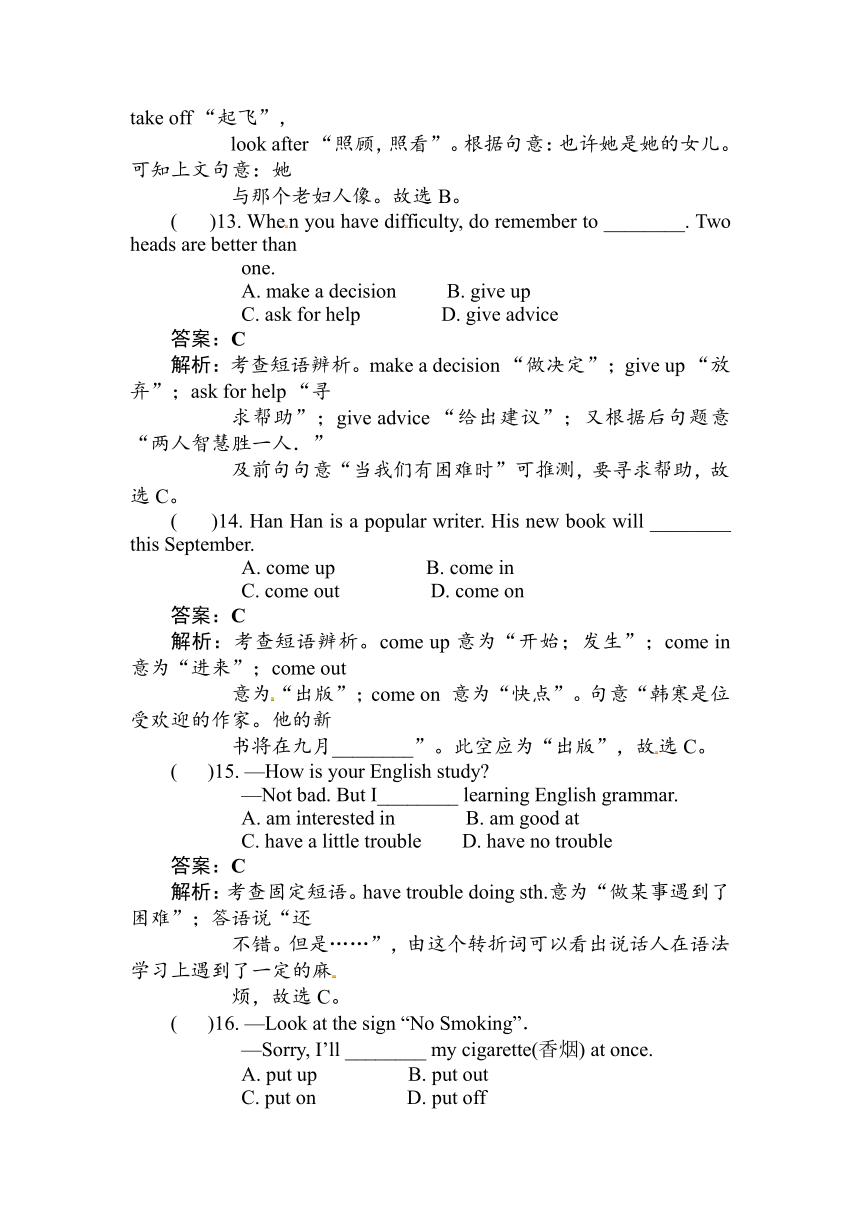2012年二轮中考英语专题资源+动词的概念(答案+解析)
文档属性
| 名称 | 2012年二轮中考英语专题资源+动词的概念(答案+解析) |

|
|
| 格式 | zip | ||
| 文件大小 | 19.9KB | ||
| 资源类型 | 教案 | ||
| 版本资源 | 通用版 | ||
| 科目 | 英语 | ||
| 更新时间 | 2012-04-23 00:00:00 | ||
图片预览




文档简介
2012年二轮中考英语专题资源+动词的概念(答案+解析)
基础巩固
Ⅰ.单项选择
( )1. —What’s your plan for this weekend
—I’m going to ________ it with my grandparents.
A. cost B. spend
C. give D. pay
答案:B
解析:考查词义辨析。cost值多少钱,物作主语;spend花费,度过,人作主语;give
给某人某物;pay付款,人作主语。排除A。句意:跟我爷爷奶奶度过周末。故
选B。
( )2. You should take off your shoes before you ________ the new flat.
A. leave B. find
C. choose D. enter
答案:D
解析:考查词义辨析。leave“离开,留下”;find“找到,发现”;choose“选择”;
enter“进入”,根据句意“在你进入新公寓之前,你要脱掉你的鞋子”,故选D。
( )3. I was so tired this morning that I couldn’t ________ early as usual.
A. get up B. get on
C. get off D. give up
答案:A
解析:考查短语辨析。get up“起床”;get on上(车、船等);get off下(车、船等);give
up“放弃”。由前半部分句意“今天早晨我太疲劳了”可知起床不可能早。故选
A。
( )4. —Three problems are too hard to ________. Will you give me some advice
—There are many ways. The most important is to have a careful plan.
A. work out B. look out
C. hand out D. break out
答案:A
解析:考查短语辨析。work out算出,制定出;look out 当心,小心; hand out 分发,
施舍;break out(战争、火灾等)爆发,(疾病的)突然发生。故选A。
( )5. —Do you take exercise every day
—Yes. I always ________ thirty minutes walking after supper.
A. spend B. cost
C. take D. pay
答案:A
解析:考查词义辨析。spend 人做主语,spend+钱或时间+on sth./in doing sth; cost物
作主语,花钱; take一般用it takes sb. 一段时间 for sb. to do sth.; pay 人做主语,
一般用pay for 表示付钱。
( )6. —How long can I have your dictionary
—________it till next term.
A. Hold B. Take
C. Return D. Keep
答案:D
解析:词义辨析。how long“多久”,必须与延续性动词连用,故选D,意为“借”,
延续性动词。
( )7. If you don’t work hard for most of the year and then work hard for only a few days
before the exam, you will probably ________.
A. succeed B. finish
C. fail D. pass
答案:C
解析:考查词义辨析。根据句意“如果你一年中大部分时间不努力学习并只在考试前努
力,”可以推断“那么你将可能失败。”,故选C。
( )8. —The T shirt looks nice on you! How much does it________?
—I just________ten dollars for it.
A. take; afforded B. cost; paid
C. cost; spent
答案:B
解析:考查固定用法。注意以下句型:“sb. spends money/time+on/in doing sth.”;
“It/sth. costs (sb.)+money”;“It takes sb. time to do sth.”;“sb. pays+money for
sth.”;“afford to do sth.”(负担得起做某事)。根据本题句意选B。
( )9. Many volunteers ________ food and water to the local people in Japan after the
tsunami.
A. gave out B. cut out
C. put out D. found out
答案:A
解析:考查短语辨析。句意:日本的海啸发生后许多志愿者给当地人民提供了食物和水。
gave out提供,分发;cut out切断;put out熄灭;found out查出。
( )10. —The little girl ________ her seat to an old man on the bus.
—What a kind girl!
A. brought B. offered
C. gave D. lent
答案:B
解析:考查词义辨析。brought是“带来”的意思;offered是“提供” 的意思;gave 是
“把某物给某人”;lent是借给某人。根据句意“小女孩把她的座位给了老人”。
( )11. —Your bedroom is so dirty. Would you please ________,Peter
—OK, mum. I’ll do it right away.
A. set it up B. put it on
C. pick it up D. clean it up
答案:D
解析:考查短语辨析。set up“建立”, put on“穿上”,pick up “捡起”,clean up “清
理,打扫”。根据句意:你的卧室很脏,你可以去打扫吗?故选D。
( )12. The girl ________ the woman. Maybe she is her daughter.
A. takes care B. takes after
C. takes off D. looks after
答案:B
解析:考查短语辨析。take care“小心”,take after “与……像”,take off “起飞”,
look after “照顾,照看”。根据句意:也许她是她的女儿。可知上文句意:她
与那个老妇人像。故选B。
( )13. When you have difficulty, do remember to ________. Two heads are better than
one.
A. make a decision B. give up
C. ask for help D. give advice
答案:C
解析:考查短语辨析。make a decision “做决定”;give up “放弃”;ask for help “寻
求帮助”;give advice “给出建议”;又根据后句题意 “两人智慧胜一人.”
及前句句意“当我们有困难时”可推测,要寻求帮助,故选C。
( )14. Han Han is a popular writer. His new book will ________ this September.
A. come up B. come in
C. come out D. come on
答案:C
解析:考查短语辨析。come up意为“开始;发生”;come in意为“进来”;come out
意为“出版”;come on 意为“快点”。句意“韩寒是位受欢迎的作家。他的新
书将在九月________”。此空应为“出版”,故选C。
( )15. —How is your English study
—Not bad. But I________ learning English grammar.
A. am interested in B. am good at
C. have a little trouble D. have no trouble
答案:C
解析:考查固定短语。have trouble doing sth.意为“做某事遇到了困难”;答语说“还
不错。但是……”,由这个转折词可以看出说话人在语法学习上遇到了一定的麻
烦,故选C。
( )16. —Look at the sign “No Smoking”.
—Sorry, I’ll ________ my cigarette(香烟) at once.
A. put up B. put out
C. put on D. put off
答案:B
解析:考查词义辨析。put up意为“张贴,搭建”;put out意为“熄灭”;put on“穿
上,扮演”;put off意为“推迟”。句意:看这“禁止吸烟”标志。对不起,我
马上熄灭我的香烟。故选B。
( )17. I’m not sure whether I can hold a party in the open air, because it ________ the
weather.
A. stands for B. depends on
C. lives on D. agrees with
答案:B
解析:考查词义辨析。A项意思是“代表,象征……”;C项意思是“靠……生活”;
D项意思是“同意……”。根据句意:是否举行宴会不确定,得取决于天气状况。
B项意思是“取决于……”。符合题意。
( )18. “Don’t ________ to strangers on your way to and from school”, mother often
________ to me.
A. speak; says B. speak; tells
C. talk; speaks D. talk; tells
答案:A
解析:考查词义辨析。句意:“在你上学或放学的途中,不要对陌生人讲话”,妈妈常
常对我说。speak to sb.对某人讲,say侧重于讲话的内容,故选A。
( )19. —Dinner is ready. Help yourself!
—Wow! It ________ delicious. Could you please tell me how to cook it
A. tastes B. looks
C. sounds D. feels
答案:A
解析:考查词义辨析。根据句意“你能告诉我怎样做的吗?”说明它应该闻起来非常美
味。
( )20. —________ I smoke here
—No. You are not allowed to smoke in public places.
A. Could B. Must
C. May D. Might
答案:C
解析:考查情态动词。May表示请求对方的建议,根据句意:我可以在这抽烟吗?不
行,公共场合不许抽烟。故选C。
综合提能
Ⅰ.完形填空
Suppose(假设) you are going to Boston, and you __1__ the city before. If someone __2__ you about the interesting places in the city, you __3__ to get some ideas of what you will see. But don’t have a __4__ idea of where these places are or of how to find __5__. However, __6__ someone has a map of the city and __7__ you the main roads and buildings, you may say, “Oh, now I see. I can find my way with __8__ trouble at all”. Working in math is somewhat(有点儿) like trying to find your way __9__ a new city. Perhaps the words may tell you some information and you have __10__ it, but you can’t see any clear road __11__ the answers.
Maybe you __12__ a kind of map of the main roads in maths __13__ you find your way. Explore(探究)what lies in maths, and __14__to find the main roads. They will __15__ you to the answer. If you can find the “map”, the maths problems will be easily worked out.
( )1. A. are going to visit B. once visited
C. have never visited D. have ever visit
( )2. A. answers B. shows
C. meets D. tells
( )3. A. begin B. like
C. learn D. refuse
( )4. A. clever B. clear
C. strange D. wrong
( )5. A. someone B. Boston
C. them D. it
( )6. A. if B. though
C. whether D. since
( )7. A. helps B. gives
C. passes D. shows
( )8. A. not B. no
C. some D. much
( )9. A. of B. to
C. in D. around
( )10. A. thought over B. heard about
C. written down D. talked with
( )11. A. with B. for
C. of D. to
( )12. A. need to have B. don’t need
C. needn’t D. in need of
( )13. A. help B. to help
C. helps D. help with
( )14. A. try your best B. take your place
C. look up D. walk on
( )15. A. keep B. send
C. lead D. ask
语篇解读:文章以在陌生的城市找名胜为例,说明了解决数学最重要的是先找出一条通往答案的路径。
1.C。下文表明:你要去的是一个一点儿都不熟悉的城市,说明以前没有去过。故选have never visited。
2.D。show意为“带领某人参观某地”或“向某人展示某物”;tell sb. about sth. 意为“告诉某人关于……的情况。根据下文可知tell为正确选项。
3.A。文章表明:听了别人的介绍后,你对城市的名胜开始有了一些初步的印象。故选begin。
4.B。根据文意,你对名胜的概况只是听说而已,对名胜的具体位置及如何找到所指的名胜不太清楚。故选clear。
5.C。指代上文出现的interesting places应用them。
6.A。根据句意,前半句是后半句的条件状语从句,应用if引导。
7.D。show sb. sth.意为“把……给某人看”,符合文意,为正确选项。
8.B。根据地图上的位置,你会毫不费力地找到想去的地方。故选no。
9.C。本文是讲如何在一个陌生的城市里找到目的地,而不是找去某个城市的路。故选in。
10.A。做数学题时,你肯定要对题目中所给的信息进行思考。故应选thought over。
11.D。the road to the answers意为“解决问题的路径”,to为正确选项。
12.A。根据上文列举的根据地图找名胜的例子可知,做数学题目也需要“地图”。故应选need to have。
13.B。这里应该用动词不定式to help you find your way作目的状语才合符句意。
14.A。try one’s best to do sth.意思是“尽某人最大的努力去做某事”,为正确选项。
15.C。“lead sb. to某地”意思是“引导某人到达某地”。
Ⅱ.阅读短文,选择最佳答案
In the West, some people believe that personality can be predicted according to the time of the year the person was born. From China comes the belief that the year of birth influences one’s personality. In the past century, a new belief has arisen: the idea that personality is related to one’s ABO blood type. People with blood type A, for example, are considered more likely to be serious, hard working, and quiet, while people with blood type O are likely to be popular and outgoing, yet often unable to finish what they start. Though this belief continues to be strong, some people question whether it is true.
The blood type personality theory(理论) started in Japan in 1927 when Furukawa Takeji noticed personality similarities and differences among his workers. The idea soon went out of fashion, but was brought back by a Japanese television host named Toshitaka Nomi in the 1970s. the belief is still strong in Japan and is increasingly popular in neighboring countries. Some_young_Koreans_have_taken_to_the_theory. A recent study showed 76 percent of Koreans aged between 13 and 64 believe in the blood type personality connection. Though most Asian might believe in the blood type theory, for many it seems harmless and not something to be taken too seriously.
There is also the possibility that people are influenced to change their personality to match the expected stereotypes(思维定式). A survey of studies made in Japan over a 10 year period found that while in the 1970s there was no relationship increased a little. Researchers concluded that as the belief in the stereotypes increases, people may be changing their personality to follow the blood type theory.
Is the belief true The scientists in Asia largely dismiss the belief as a modern day superstition(迷信). Most studies have failed to find any strong connection between blood and personality. Generally, scientists warn against making predictions or important decisions based on this questionable theory.
(2010北京)
( )1. The writer uses blood type A and O as an example to explain ________.
A. the difference between the two blood types
B. the relationship between the two types
C. the influence of blood type on one’s behavior
D. the connection between personality and blood type
( )2. What does the underlined sentence in Paragraph 2 mean
A. It was lightly believed.
B. It was brought to them.
C. They liked and accepted it.
D. They stole the idea from others.
( )3. Which of the following is true according to the passage
A. Most scientists in Asia don’t believe in the theory.
B. The blood type theory began in Japan in the 1970s.
C. The blood type personality theory is abut blood type.
D. People don’t change their personality to match the theory.
( )4. What is the best title for the passage
A. Is the blood type theory popular
B. Is the personality changeable
C. Is it in your blood
D. Is it in your mind
语篇解读:本文是一篇说明文,从不同角度的说明人的性格的形成。有的说与出生年代有关的,有的说与血型有关的,对此人们的态度各不一样。
1. D。细节理解题。由第一段第三句中的 “the idea that personality is related to one’s ABO blood type(这种观点是把性格与人的ABO血型联系起来)”可知。
2. C。句意猜测题。由上下句可知本句意为:韩国一些年轻人已经接受了这种理论。
3. A。细节理解题。由最后一段的内容可知:亚洲的大多数科学家不相信这种理论。
4. C。归纳概括题。由全文的内容我们可知这是一个有争议的话题,所以文章题目应是能概括本文大意的。
基础巩固
Ⅰ.单项选择
( )1. —What’s your plan for this weekend
—I’m going to ________ it with my grandparents.
A. cost B. spend
C. give D. pay
答案:B
解析:考查词义辨析。cost值多少钱,物作主语;spend花费,度过,人作主语;give
给某人某物;pay付款,人作主语。排除A。句意:跟我爷爷奶奶度过周末。故
选B。
( )2. You should take off your shoes before you ________ the new flat.
A. leave B. find
C. choose D. enter
答案:D
解析:考查词义辨析。leave“离开,留下”;find“找到,发现”;choose“选择”;
enter“进入”,根据句意“在你进入新公寓之前,你要脱掉你的鞋子”,故选D。
( )3. I was so tired this morning that I couldn’t ________ early as usual.
A. get up B. get on
C. get off D. give up
答案:A
解析:考查短语辨析。get up“起床”;get on上(车、船等);get off下(车、船等);give
up“放弃”。由前半部分句意“今天早晨我太疲劳了”可知起床不可能早。故选
A。
( )4. —Three problems are too hard to ________. Will you give me some advice
—There are many ways. The most important is to have a careful plan.
A. work out B. look out
C. hand out D. break out
答案:A
解析:考查短语辨析。work out算出,制定出;look out 当心,小心; hand out 分发,
施舍;break out(战争、火灾等)爆发,(疾病的)突然发生。故选A。
( )5. —Do you take exercise every day
—Yes. I always ________ thirty minutes walking after supper.
A. spend B. cost
C. take D. pay
答案:A
解析:考查词义辨析。spend 人做主语,spend+钱或时间+on sth./in doing sth; cost物
作主语,花钱; take一般用it takes sb. 一段时间 for sb. to do sth.; pay 人做主语,
一般用pay for 表示付钱。
( )6. —How long can I have your dictionary
—________it till next term.
A. Hold B. Take
C. Return D. Keep
答案:D
解析:词义辨析。how long“多久”,必须与延续性动词连用,故选D,意为“借”,
延续性动词。
( )7. If you don’t work hard for most of the year and then work hard for only a few days
before the exam, you will probably ________.
A. succeed B. finish
C. fail D. pass
答案:C
解析:考查词义辨析。根据句意“如果你一年中大部分时间不努力学习并只在考试前努
力,”可以推断“那么你将可能失败。”,故选C。
( )8. —The T shirt looks nice on you! How much does it________?
—I just________ten dollars for it.
A. take; afforded B. cost; paid
C. cost; spent
答案:B
解析:考查固定用法。注意以下句型:“sb. spends money/time+on/in doing sth.”;
“It/sth. costs (sb.)+money”;“It takes sb. time to do sth.”;“sb. pays+money for
sth.”;“afford to do sth.”(负担得起做某事)。根据本题句意选B。
( )9. Many volunteers ________ food and water to the local people in Japan after the
tsunami.
A. gave out B. cut out
C. put out D. found out
答案:A
解析:考查短语辨析。句意:日本的海啸发生后许多志愿者给当地人民提供了食物和水。
gave out提供,分发;cut out切断;put out熄灭;found out查出。
( )10. —The little girl ________ her seat to an old man on the bus.
—What a kind girl!
A. brought B. offered
C. gave D. lent
答案:B
解析:考查词义辨析。brought是“带来”的意思;offered是“提供” 的意思;gave 是
“把某物给某人”;lent是借给某人。根据句意“小女孩把她的座位给了老人”。
( )11. —Your bedroom is so dirty. Would you please ________,Peter
—OK, mum. I’ll do it right away.
A. set it up B. put it on
C. pick it up D. clean it up
答案:D
解析:考查短语辨析。set up“建立”, put on“穿上”,pick up “捡起”,clean up “清
理,打扫”。根据句意:你的卧室很脏,你可以去打扫吗?故选D。
( )12. The girl ________ the woman. Maybe she is her daughter.
A. takes care B. takes after
C. takes off D. looks after
答案:B
解析:考查短语辨析。take care“小心”,take after “与……像”,take off “起飞”,
look after “照顾,照看”。根据句意:也许她是她的女儿。可知上文句意:她
与那个老妇人像。故选B。
( )13. When you have difficulty, do remember to ________. Two heads are better than
one.
A. make a decision B. give up
C. ask for help D. give advice
答案:C
解析:考查短语辨析。make a decision “做决定”;give up “放弃”;ask for help “寻
求帮助”;give advice “给出建议”;又根据后句题意 “两人智慧胜一人.”
及前句句意“当我们有困难时”可推测,要寻求帮助,故选C。
( )14. Han Han is a popular writer. His new book will ________ this September.
A. come up B. come in
C. come out D. come on
答案:C
解析:考查短语辨析。come up意为“开始;发生”;come in意为“进来”;come out
意为“出版”;come on 意为“快点”。句意“韩寒是位受欢迎的作家。他的新
书将在九月________”。此空应为“出版”,故选C。
( )15. —How is your English study
—Not bad. But I________ learning English grammar.
A. am interested in B. am good at
C. have a little trouble D. have no trouble
答案:C
解析:考查固定短语。have trouble doing sth.意为“做某事遇到了困难”;答语说“还
不错。但是……”,由这个转折词可以看出说话人在语法学习上遇到了一定的麻
烦,故选C。
( )16. —Look at the sign “No Smoking”.
—Sorry, I’ll ________ my cigarette(香烟) at once.
A. put up B. put out
C. put on D. put off
答案:B
解析:考查词义辨析。put up意为“张贴,搭建”;put out意为“熄灭”;put on“穿
上,扮演”;put off意为“推迟”。句意:看这“禁止吸烟”标志。对不起,我
马上熄灭我的香烟。故选B。
( )17. I’m not sure whether I can hold a party in the open air, because it ________ the
weather.
A. stands for B. depends on
C. lives on D. agrees with
答案:B
解析:考查词义辨析。A项意思是“代表,象征……”;C项意思是“靠……生活”;
D项意思是“同意……”。根据句意:是否举行宴会不确定,得取决于天气状况。
B项意思是“取决于……”。符合题意。
( )18. “Don’t ________ to strangers on your way to and from school”, mother often
________ to me.
A. speak; says B. speak; tells
C. talk; speaks D. talk; tells
答案:A
解析:考查词义辨析。句意:“在你上学或放学的途中,不要对陌生人讲话”,妈妈常
常对我说。speak to sb.对某人讲,say侧重于讲话的内容,故选A。
( )19. —Dinner is ready. Help yourself!
—Wow! It ________ delicious. Could you please tell me how to cook it
A. tastes B. looks
C. sounds D. feels
答案:A
解析:考查词义辨析。根据句意“你能告诉我怎样做的吗?”说明它应该闻起来非常美
味。
( )20. —________ I smoke here
—No. You are not allowed to smoke in public places.
A. Could B. Must
C. May D. Might
答案:C
解析:考查情态动词。May表示请求对方的建议,根据句意:我可以在这抽烟吗?不
行,公共场合不许抽烟。故选C。
综合提能
Ⅰ.完形填空
Suppose(假设) you are going to Boston, and you __1__ the city before. If someone __2__ you about the interesting places in the city, you __3__ to get some ideas of what you will see. But don’t have a __4__ idea of where these places are or of how to find __5__. However, __6__ someone has a map of the city and __7__ you the main roads and buildings, you may say, “Oh, now I see. I can find my way with __8__ trouble at all”. Working in math is somewhat(有点儿) like trying to find your way __9__ a new city. Perhaps the words may tell you some information and you have __10__ it, but you can’t see any clear road __11__ the answers.
Maybe you __12__ a kind of map of the main roads in maths __13__ you find your way. Explore(探究)what lies in maths, and __14__to find the main roads. They will __15__ you to the answer. If you can find the “map”, the maths problems will be easily worked out.
( )1. A. are going to visit B. once visited
C. have never visited D. have ever visit
( )2. A. answers B. shows
C. meets D. tells
( )3. A. begin B. like
C. learn D. refuse
( )4. A. clever B. clear
C. strange D. wrong
( )5. A. someone B. Boston
C. them D. it
( )6. A. if B. though
C. whether D. since
( )7. A. helps B. gives
C. passes D. shows
( )8. A. not B. no
C. some D. much
( )9. A. of B. to
C. in D. around
( )10. A. thought over B. heard about
C. written down D. talked with
( )11. A. with B. for
C. of D. to
( )12. A. need to have B. don’t need
C. needn’t D. in need of
( )13. A. help B. to help
C. helps D. help with
( )14. A. try your best B. take your place
C. look up D. walk on
( )15. A. keep B. send
C. lead D. ask
语篇解读:文章以在陌生的城市找名胜为例,说明了解决数学最重要的是先找出一条通往答案的路径。
1.C。下文表明:你要去的是一个一点儿都不熟悉的城市,说明以前没有去过。故选have never visited。
2.D。show意为“带领某人参观某地”或“向某人展示某物”;tell sb. about sth. 意为“告诉某人关于……的情况。根据下文可知tell为正确选项。
3.A。文章表明:听了别人的介绍后,你对城市的名胜开始有了一些初步的印象。故选begin。
4.B。根据文意,你对名胜的概况只是听说而已,对名胜的具体位置及如何找到所指的名胜不太清楚。故选clear。
5.C。指代上文出现的interesting places应用them。
6.A。根据句意,前半句是后半句的条件状语从句,应用if引导。
7.D。show sb. sth.意为“把……给某人看”,符合文意,为正确选项。
8.B。根据地图上的位置,你会毫不费力地找到想去的地方。故选no。
9.C。本文是讲如何在一个陌生的城市里找到目的地,而不是找去某个城市的路。故选in。
10.A。做数学题时,你肯定要对题目中所给的信息进行思考。故应选thought over。
11.D。the road to the answers意为“解决问题的路径”,to为正确选项。
12.A。根据上文列举的根据地图找名胜的例子可知,做数学题目也需要“地图”。故应选need to have。
13.B。这里应该用动词不定式to help you find your way作目的状语才合符句意。
14.A。try one’s best to do sth.意思是“尽某人最大的努力去做某事”,为正确选项。
15.C。“lead sb. to某地”意思是“引导某人到达某地”。
Ⅱ.阅读短文,选择最佳答案
In the West, some people believe that personality can be predicted according to the time of the year the person was born. From China comes the belief that the year of birth influences one’s personality. In the past century, a new belief has arisen: the idea that personality is related to one’s ABO blood type. People with blood type A, for example, are considered more likely to be serious, hard working, and quiet, while people with blood type O are likely to be popular and outgoing, yet often unable to finish what they start. Though this belief continues to be strong, some people question whether it is true.
The blood type personality theory(理论) started in Japan in 1927 when Furukawa Takeji noticed personality similarities and differences among his workers. The idea soon went out of fashion, but was brought back by a Japanese television host named Toshitaka Nomi in the 1970s. the belief is still strong in Japan and is increasingly popular in neighboring countries. Some_young_Koreans_have_taken_to_the_theory. A recent study showed 76 percent of Koreans aged between 13 and 64 believe in the blood type personality connection. Though most Asian might believe in the blood type theory, for many it seems harmless and not something to be taken too seriously.
There is also the possibility that people are influenced to change their personality to match the expected stereotypes(思维定式). A survey of studies made in Japan over a 10 year period found that while in the 1970s there was no relationship increased a little. Researchers concluded that as the belief in the stereotypes increases, people may be changing their personality to follow the blood type theory.
Is the belief true The scientists in Asia largely dismiss the belief as a modern day superstition(迷信). Most studies have failed to find any strong connection between blood and personality. Generally, scientists warn against making predictions or important decisions based on this questionable theory.
(2010北京)
( )1. The writer uses blood type A and O as an example to explain ________.
A. the difference between the two blood types
B. the relationship between the two types
C. the influence of blood type on one’s behavior
D. the connection between personality and blood type
( )2. What does the underlined sentence in Paragraph 2 mean
A. It was lightly believed.
B. It was brought to them.
C. They liked and accepted it.
D. They stole the idea from others.
( )3. Which of the following is true according to the passage
A. Most scientists in Asia don’t believe in the theory.
B. The blood type theory began in Japan in the 1970s.
C. The blood type personality theory is abut blood type.
D. People don’t change their personality to match the theory.
( )4. What is the best title for the passage
A. Is the blood type theory popular
B. Is the personality changeable
C. Is it in your blood
D. Is it in your mind
语篇解读:本文是一篇说明文,从不同角度的说明人的性格的形成。有的说与出生年代有关的,有的说与血型有关的,对此人们的态度各不一样。
1. D。细节理解题。由第一段第三句中的 “the idea that personality is related to one’s ABO blood type(这种观点是把性格与人的ABO血型联系起来)”可知。
2. C。句意猜测题。由上下句可知本句意为:韩国一些年轻人已经接受了这种理论。
3. A。细节理解题。由最后一段的内容可知:亚洲的大多数科学家不相信这种理论。
4. C。归纳概括题。由全文的内容我们可知这是一个有争议的话题,所以文章题目应是能概括本文大意的。
同课章节目录
- 词法
- 名词
- 动词和动词短语
- 动词语态
- 动词时态
- 助动词和情态动词
- 非谓语动词
- 冠词
- 代词
- 数词和量词
- 形容词副词及其比较等级
- 介词和介词短语
- 连词和感叹词
- 构词法
- 相似、相近词比较
- 句法
- 陈述句
- 一般疑问句和否定疑问句
- 特殊疑问句及选择疑问句
- 反意疑问句
- 存在句(There be句型)
- 宾语从句
- 定语从句
- 状语从句
- 主谓一致问题
- 简单句
- 并列句
- 复合句
- 主谓一致
- 主、表语从句
- 名词性从句
- 直接引语和间接引语
- 虚拟语气
- 感叹句
- 强调句
- 倒装句
- 祈使句
- 句子的成分
- 句子的分类
- 题型专区
- 单项选择部分
- 易错题
- 完形填空
- 阅读理解
- 词汇练习
- 听说训练
- 句型转换
- 补全对话
- 短文改错
- 翻译
- 书面表达
- 任务型阅读
- 语法填空
- 其他资料
